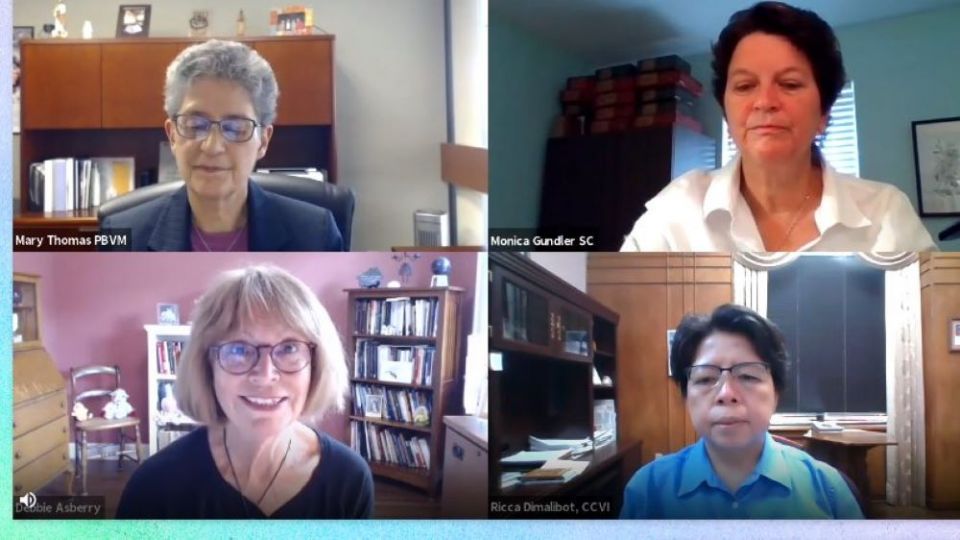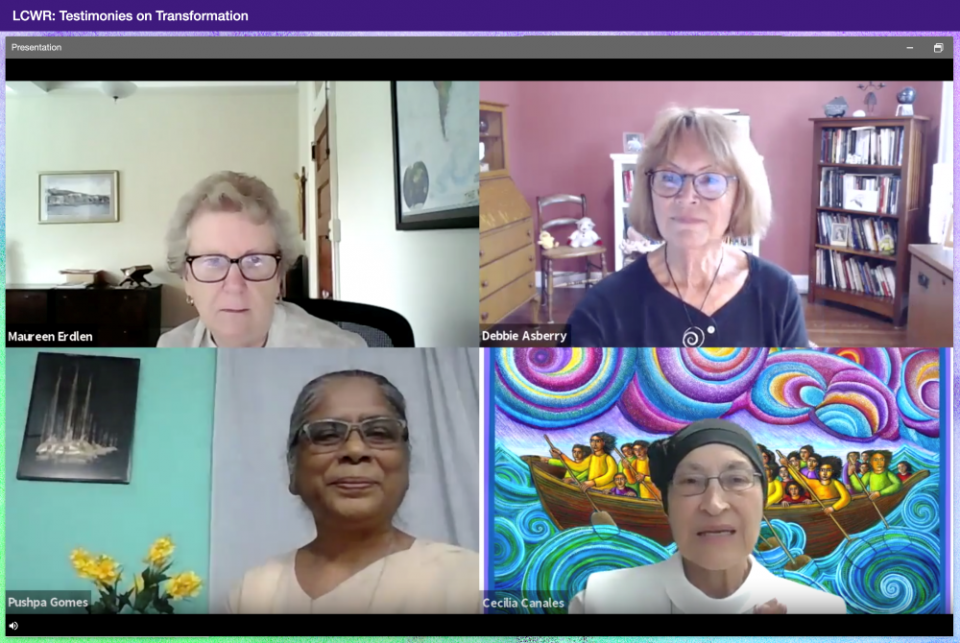LCWR 2021 Mercedes Casas speaks.JPG
In contemplating the relationships between space and time, mission and testimony, and freedom and community, Sr. Mercedes Casas Sánchez culled wisdom from poets, popes and philosophers in her Aug. 12 keynote address at the Leadership Conference of Women Religious annual assembly.
Her speech was a literary and mystical offering for the roughly 800 religious leaders in virtual attendance. Casas, a Daughter of the Holy Spirit of Mexico, posed existential questions — "Why are we here? For whom are we here? Why do we do what we do?" — and offered several suggestions for sustaining religious life.
Casas, the former president of the Confederation of Latin American and Caribbean Religious (CLAR), frequently alluded to the foremothers of religious life, the "cloud of witnesses" (Hebrews 12:1-4) who were fueled more by vision than glory in "creating spaces" for God. Born of small, impoverished beginnings, they, too, were to figure out what was being asked of them at the time.
"Now, it's our turn to run, with perseverance, that race that lies ahead of us," she said in a speech that addressed the assembly's theme, "The Realm of Transformation: Creating Space for the Future."
Advertisement
Advertisement
St. Augustine's words guided Casas' reflection on time: Remember the past, pay attention to the present, anticipate the future. Casas said God is the ultimate link to "what we have been, who we are, and what we will be."
Though religious life today can feel frail, Casas said, she reminded sisters that "we are not starting from scratch," offering Pope Francis' warning that they ought not "give in to the temptation of numbers and efficiency."
Instead, she said he encourages religious to "look to the past with gratitude" to maintain identity, to "live in the present with passion" and to "embrace the future with hope without becoming discouraged" by a vocation crisis.
Mercedes Casas Sánchez, 2018 RESIZED.jpg

Casas, who is a part of the Vatican's Congregation for Institutes of Consecrated Life and Societies of Apostolic Life, recalled once meeting a Canadian sister in her 80s. Over breakfast, the sister practiced her Spanish with Casas before leaving for her online Spanish class. Though the sister didn't speak much Spanish, her motivation came from her regular accompaniment of Hispanics arriving in Canada.
"I only join them without saying anything, but I want to learn Spanish to be able to listen to them," the Canadian sister told Casas.
"That's how I see nuns in the United States," Casas said: women living "in the present with a fiery passion."
The challenge before religious life is to create space within religious life so that charisms can grow rather than merely survive, first discerning for whom they intend this space.
"One generation can't exhaust its charism, but rather, it gives it space for it to flow as a perennial source of life and meaning," she said.
She then offered five suggestions for the "essential" that can sustain religious life at this time.
First: "Be women of the Spirit, moved by a law of freedom," setting aside the nonessential and pursuing "that place of holy abandonment" to be available "for the transformation God wants and that we want to happen in religious life."
Second, Casas suggested sisters "give new meaning to our communal life," which is both "the greatest challenge but the greatest joy" in the vocation.
Though religious life has become more "disaggregated" and communities have been "reduced to their minimum expression," Casas said she wonders how sisters can create community spaces for the future, for shared prayer, laughter, crying, meals, discerning, resting, "one generation listening to and understanding the other."
"The creativity of the Spirit can make new styles of structured communities emerge anew where there is at least the minimum structure promoting congregation, closeness, discernment of one's life and mission," she said.
LCWR 2021 Mercedes Casas discussion RESIZED.jpg

Her third suggestion is to "create spaces to transform the mission, creativity and collaboration."
"Sometimes we confuse 'work' with 'mission,' and when we can no longer 'work,' we feel that our life no longer makes sense," Casas said. "For the new generations, the type of work is less important than the opportunity to do apostolic work together. It is the mission that unites us, not necessarily work. What do we need to transform in our ministries to respond to what the Spirit and history demands of us?"
Fourth, Casas called sisters to "create space for hope." Noting that religious life throughout parts of the world is at "the darkest point of its night," Casas quoted Bengali poet Rabindranath Tagore: "If you cry at night because the sun has gone out of your life, your tears will prevent you from seeing the stars."
Creating space for hope will require sisters to discover "seeds for the future" that are present here and now, a combination of the convictions that fuel sisters today and the surprises God has in store.
"Hope gives us wings, connects us with the past and the future," Casas said, alluding to Emily Dickinson's poem " 'Hope' is the thing with feathers." "We want to live in faithful and loving hope. Hope against all expectation. Hope in the things we cannot see but know are already there, like a gift prepared for religious life by God."
Last, Casa noted the "need to revisit the signs," noting that religious life is capable of withstanding much from an aimless humanity so long as it is "faithful to its prophetic and symbolic nature." The challenge is to recover that symbolic nature, both personally and as a community, she said.
"Perhaps revisiting the signs involves purifying the activism that obscures us or our wishes to save the world, believing that we have to do everything, be everything, be pioneers in everything," she said.
And though Francis wrote in Evangelii Gaudium that an authentic faith involves "a deep desire to change the world," Casas noted the difference between doing that through testimony rather than activism.
She encouraged sisters to give "new meaning" to their community, to evangelical counsel and to their ministries, "where we seem less professional and more mystical, bearing witness."
In closing, Casas asked whether the future attracts or frightens, quoting Austrian poet Rainer Maria Rilke's "What Will You Do?" as well as Dickinson's "To make a prairie."
"What today sustains us and helps us to withstand the night that we have been experiencing will not be the longing for the past, but rather a hopeful, faithful and loving focus on the future, revitalizing the motivating force that has sustained our life to date: passion for God and for humanity," Casas said.
"We need to give an unconditional, confident 'yes' to this transformation, in loving God, like the one Mary gave."
How leading affects the leaders
The assembly's afternoon session examined the transformation sisters undergo when they are in leadership positions, a change that is not always comfortable or wanted. Three sisters offered testimonies on how leadership affected them.
Sr. Cecilia Canales of the Dominican Sisters of Mission San Jose in California said she was "a very reluctant leader" and in her time as prioress has faced the coronavirus pandemic, a California wildfire and a cancer diagnosis. But she found comfort in a painting of Jesus calming the storm and a candy wrapper that said, "Everything will be all right in the end. If it isn't all right, it isn't the end."
"We're all in the boat together. We're fighting a huge storm we don't understand, but in the middle is Mary and Jesus," Canales said. "And that has been a huge consolation to me."
LCWR 2021 leadership affecting leaders RESIZED.png

Sr. Maureen Erdlen, president of the Sisters of St. Joseph of Philadelphia, said leadership has been like walking through a thick fog in which the only thing guiding her forward is a light that is sometimes dim, sometimes bright, but always there.
"I keep walking and keep focused on the light," she said.
Sr. Pushpa Gomes, first councilor with the Sisters of the Holy Cross, spoke from Bangladesh, telling participants she learned the hard way she needed to schedule time for prayer, rest and recreation and to stick to it. She found inspiration gardening, seeing how the proper care for plants and trees allowed them to transform.
The willingness to transform "needs to be renewed daily," she said, "and is a lifelong process."
[GSR national correspondent Dan Stockman contributed to this story.]
Like what you're reading? Sign up for GSR e-newsletters!


